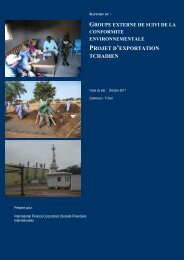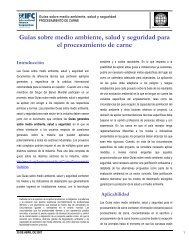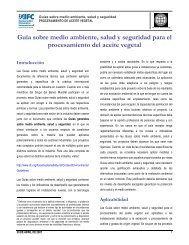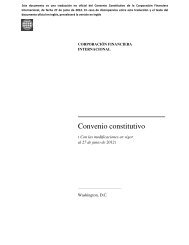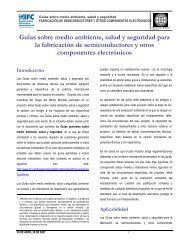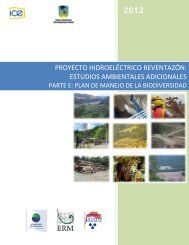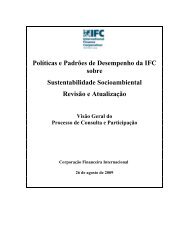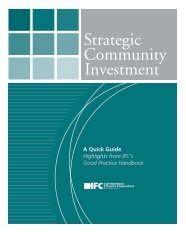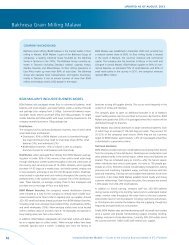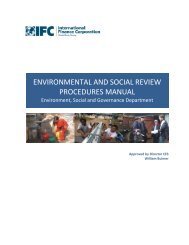Economic Opportunities for Women in the Pacific - Case - IFC
Economic Opportunities for Women in the Pacific - Case - IFC
Economic Opportunities for Women in the Pacific - Case - IFC
- No tags were found...
You also want an ePaper? Increase the reach of your titles
YUMPU automatically turns print PDFs into web optimized ePapers that Google loves.
While this situation is burdensome <strong>for</strong> all bus<strong>in</strong>esses,<br />
women suffer disproportionately. There is strong evidence<br />
of discrim<strong>in</strong>atory attitudes and practices towards women<br />
on <strong>the</strong> part of judges and o<strong>the</strong>r court officials. A study<br />
carried out <strong>in</strong> 2005 found that progress of women-related<br />
cases ma<strong>in</strong>ly related to gender based violence <strong>in</strong> courts is<br />
extremely slow, and non-existent <strong>in</strong> many cases. Accord<strong>in</strong>g<br />
to this study, only 16 percent of all women-related cases<br />
actually proceed to <strong>the</strong> trial stage. 11 Alarmed by this<br />
situation, a <strong>Women</strong>’s Justice Unit was established <strong>in</strong> 2004<br />
to monitor cases and decisions <strong>in</strong>volv<strong>in</strong>g women. The unit is<br />
now provid<strong>in</strong>g legal assistance to women <strong>in</strong> cases <strong>in</strong>volv<strong>in</strong>g<br />
domestic and sexual violence, and is monitor<strong>in</strong>g <strong>the</strong> legal<br />
process <strong>in</strong> <strong>the</strong> courts <strong>for</strong> women <strong>in</strong>volv<strong>in</strong>g both commercial<br />
and crim<strong>in</strong>al cases.<br />
With <strong>the</strong> <strong>for</strong>mal system <strong>in</strong>effective, <strong>the</strong> traditional ‘adat’<br />
approach is to seek <strong>the</strong> <strong>in</strong>tervention of a trusted community<br />
leader who asks <strong>the</strong> villagers to congregate toge<strong>the</strong>r and<br />
discuss <strong>the</strong> issue at hand. However, women are not allowed<br />
to jo<strong>in</strong> <strong>the</strong> congregation, unless <strong>the</strong>y need to give evidence<br />
as a party to <strong>the</strong> dispute or as a witness.<br />
Community elders normally decide on a solution and a fee<br />
to be paid, and <strong>the</strong> process concludes with a traditional<br />
ceremony. A key challenge is that <strong>the</strong> traditional system<br />
absolves <strong>in</strong>dividuals from negotiat<strong>in</strong>g a solution to <strong>the</strong><br />
problem – it is left to a third party to decide.<br />
Fees and <strong>the</strong> cost of host<strong>in</strong>g <strong>the</strong> traditional ceremony make<br />
this system of conflict resolution expensive. As a result, a<br />
large number of conflicts are not settled at all. Moreover,<br />
women are excluded from <strong>the</strong> process, and <strong>the</strong>y often<br />
lack <strong>the</strong> knowledge that <strong>the</strong>y even have <strong>the</strong> right to access<br />
justice, let alone know<strong>in</strong>g what <strong>the</strong>ir rights are. Given this<br />
situation, it is no wonder that Donna Helena prefers verbal<br />
contract arrangements. However, clients that come to her<br />
through word of mouth do not always pay her bill without<br />
rem<strong>in</strong>ders. While some do pay with<strong>in</strong> a week or two, o<strong>the</strong>rs<br />
do not pay <strong>for</strong> up to a few months. She or one of her<br />
sons has to go to <strong>the</strong> clients’ office <strong>in</strong> Dili to ask <strong>the</strong>m <strong>for</strong><br />
payment. The bottleneck is often with <strong>the</strong> f<strong>in</strong>ance staff <strong>in</strong><br />
<strong>the</strong> departments who are also seek<strong>in</strong>g funds from o<strong>the</strong>rs to<br />
pay <strong>the</strong>ir various creditors. If debtors do not pay, she often<br />
decides that she will not cater <strong>for</strong> <strong>the</strong>m <strong>in</strong> <strong>the</strong> future.<br />
12<br />
11 Bere, Ma. 2005. “<strong>Women</strong> and Justice <strong>in</strong> Timor-Leste.”<br />
Development Bullet<strong>in</strong> No 68, pp.55 - 57.<br />
Know<strong>in</strong>g someone can greatly <strong>in</strong>fluence <strong>the</strong> speed by which<br />
a contractual dispute can be resolved. Donna Helena laughs<br />
recount<strong>in</strong>g how <strong>the</strong> President of Timor-Leste assisted her <strong>in</strong><br />
<strong>the</strong> past. He <strong>in</strong>sisted to <strong>the</strong> government departments that if<br />
“<strong>the</strong>y want to keep us<strong>in</strong>g Helena’s cater<strong>in</strong>g <strong>the</strong>y should go<br />
and pay her immediately.” This has helped and often meant<br />
immediate down payment of 50 percent of <strong>the</strong> outstand<strong>in</strong>g<br />
amount. Despite such occasional help, issues of cash flow<br />
and work<strong>in</strong>g capital rema<strong>in</strong> critical <strong>for</strong> Donna Helena’s small<br />
bus<strong>in</strong>ess.<br />
Next Steps Donna Helena cont<strong>in</strong>ues to work from home,<br />
on <strong>the</strong> land and property left to her by her husband who<br />
passed away several years ago. She is content <strong>the</strong>re, but<br />
would save more time if she or her sons didn’t need to keep<br />
chas<strong>in</strong>g after unpaid bills. The cash flow of <strong>the</strong> bus<strong>in</strong>ess<br />
deeply affects how she can provide <strong>for</strong> her family. She<br />
would prefer debtors to pay more promptly, so she could<br />
better look after her family, have more time and avoid<br />
contract disputes and <strong>the</strong> courts.<br />
What makes her happy about be<strong>in</strong>g <strong>in</strong> bus<strong>in</strong>ess? “Be<strong>in</strong>g<br />
able to have my own money and look after those around<br />
me,” she says.<br />
Donna Helena, like many women who have been through<br />
years of Portuguese and Indonesian rule, <strong>the</strong> 1999 crisis<br />
that led to <strong>the</strong> country’s <strong>in</strong>dependence and <strong>the</strong> 2006<br />
turmoil <strong>in</strong> Timor-Leste, are most concerned with <strong>the</strong>ir<br />
family’s immediate welfare. She is less concerned with<br />
grow<strong>in</strong>g <strong>the</strong> bus<strong>in</strong>ess. “I have no plans <strong>for</strong> <strong>the</strong> future and<br />
am happily look<strong>in</strong>g after <strong>the</strong> bus<strong>in</strong>ess and my six children,<br />
and <strong>the</strong>ir grandchildren. The money from Pastaleria<br />
Malmequer helps me look after my family.”


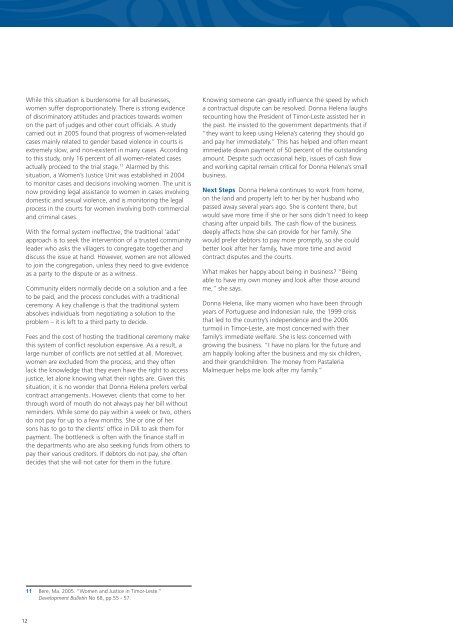
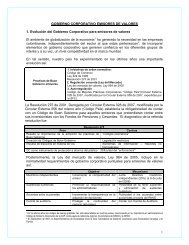
![Business Membership Organizations [pdf] - IFC](https://img.yumpu.com/15413100/1/190x245/business-membership-organizations-pdf-ifc.jpg?quality=85)
